The Body in the Workplace
What is your ideal work environment?
What does the room like like: the walls, windows, furniture, equipment?
What are you wearing?
Are you alone or with others and if so how far apart?
How do you interact with others in person, online or on the phone?
What is your relation to the outdoors?
Are there any sounds?
What is the temperature?
What is your work schedule?
What do you do on your breaks?
What kind of ideal work does this utopia produce?
What psychophysical sacrifices do we make to sit 8 hours or more a day chained to a chair and computer?

Student Bonnie Linn (Spring,1997) used the reality and metaphor of windows to ground her study on the
body in the workplace:
DO WINDOWS MAKE A DIFFERENCE IN THE OFFICE?
Do windows have the same affect on women as men?
Do windows make a person more creative?
Does having a window make work more pleasurable?
Does having a window make coming to work easier?
Do you feel more important when you have a window?
What would it mean to you to have a window?
Does it matter how big the window is?
Would you want the window to have a blind?
What do you think about when you look out the window?
Is it easier to think with a window?
Do you problems fade as you look out the window?
Does having a windowed office make an attorney a sharper legal pundit
And does it affect men and women differently?
How do you feel when the sun goes down during the winter?
How do you feel when the sun goes down during the summer?
How do you feel when you see a beautiful sunset?
Does your creativity fade with the sun?
How do you feel on a cloudy day?
How do you feel on a rainy day?
How do you feel on a beautiful summer day?
What hours do you like the best out your window?
What hours do you like the least?
Do you like to watch people out your window?
Do you stare out your window?
Do you like to watch people out your window?
Do you stare out your window?
Does having a windowed office make an attorney a sharper legal pundit
in the summer or winter and does it affect men and women differently?
What feelings did you have going from a non-window to a window office/
What was your first thought?
How often to you think "I am so glad I have a window?"\
How long did it take you to stop looking out the window every time
You walked into your office?
Are you aware of looking out your window or do you do it without realizing it?
How many years did it take you to get a window office?
Do you like your view?
Are women's and men's perceptions the same when moving from a non-window
office to a window office and do those perceptions make them a more clever legal pundit?"
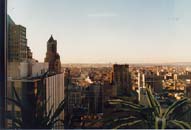

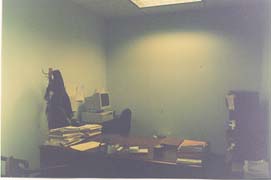
Guess which one is my window? (Bonnie Linn)
Click here to read about
Bonnie's academic research on how windows affect the bodymind.
Student Nord Pabarue did a project on stress in the stockmarket. Contrast the
two sets of pictures he took showing how the businessman accumulated stress
and then ways of relieving it. Imagine what his body must feel like all day
with his head glued sideways to the telephone, his spine twisted into
scoliosis, his hands clutched in a pre-carpal tunnel syndrome and his
cardiovascular system getting ready for strokes and heart attacks. Use the Facial
Affect Scoring Test to analyse his facial expression. 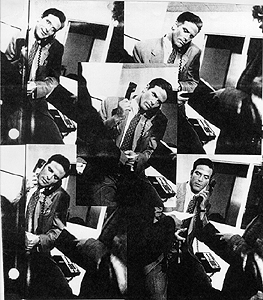 Then analyse how
emotions and energy are released in Nord's other set of pictures. How do you alleviate stress?
Then analyse how
emotions and energy are released in Nord's other set of pictures. How do you alleviate stress?
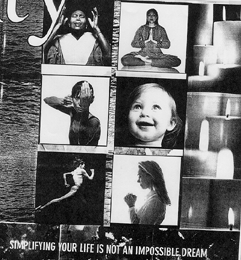
Most corporations feel they have to imprison the body with formal suits, chairs, high tech equipment and physical inactivity in order to make the mind conform to the task at hand. Does this kind of rigor mortis encourage or discourage optimal intellectual functioning? Does conformity in dress, behavior and posture encourage mental obedience to the larger body's (corporation's) goals? What would happen if everyone (CEOs and receptionists) wore jogging outfits to work and had 20 minute mandatory exercise breaks every 2 hours? Would it be easier or harder to channel aggression and focus on the work? What would happen if they lay down and meditated in the fresh air for twenty minutes every 2 hours? Would they get so mellow they'd lose their competitive spirit? Do all races, genders and nationalities resolve conflict in the same way? What would happen if workers engaged in martial arts or competitive sports for the last hour of everyday? What would happen if they got a mandatory 15 minute stand-up comedy show live or on tape before going home? Would there be less wife beating or violence in the workplace? How do you feel after a day at the office?
Student Jonathan Farer describes the consultant's life with these pictures:
 Describe how your perceptions of space and time differ from a colleague's. Are you punctual or is your creativity hampered by schedules? Do you need empty space around you to think or can you come up with just as many ideas in the subway at rush hour? Do you like to socialize with colleagues, combining personal and professional relationships or does too much indiscriminate intimacy dissipate your focus? Do you think your body has another language that undermines what you actually say to people?
Describe how your perceptions of space and time differ from a colleague's. Are you punctual or is your creativity hampered by schedules? Do you need empty space around you to think or can you come up with just as many ideas in the subway at rush hour? Do you like to socialize with colleagues, combining personal and professional relationships or does too much indiscriminate intimacy dissipate your focus? Do you think your body has another language that undermines what you actually say to people?
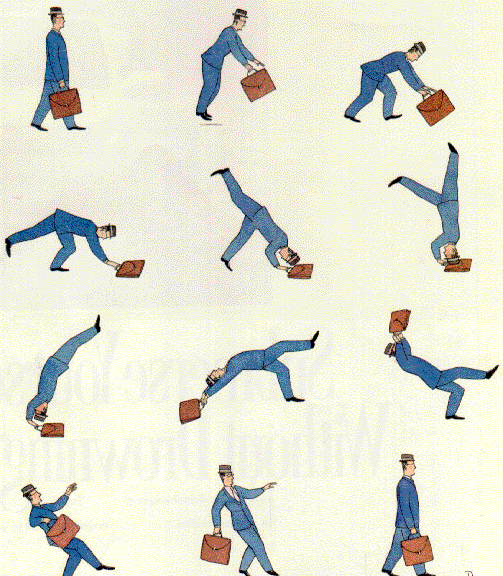
How can business majors use other disciplines such as literature, philosophy and health science to enhance their creativity and flexibility in the marketplace?
"With every tool man is perfecting his own organs, whether motor or sensory, or is removing the limits to their functioning. Motor power places gigantic forces at his disposal, which like his muscles, he can employ in any direction' thanks to ships and aircraft neither water nor air can hinder his movements; by means of spectacles he corrects defects in the lens of his own eye; by means of the telescope he sees into the far distance; and by means of the microscope he overcomes the limits of visibility set by the structure of his retina....Man has, as it were, become a kind of prosthetic God.
--Sigmund Freud in Civilisation and Its Discontents
[main page]

 Describe how your perceptions of space and time differ from a colleague's. Are you punctual or is your creativity hampered by schedules? Do you need empty space around you to think or can you come up with just as many ideas in the subway at rush hour? Do you like to socialize with colleagues, combining personal and professional relationships or does too much indiscriminate intimacy dissipate your focus? Do you think your body has another language that undermines what you actually say to people?
Describe how your perceptions of space and time differ from a colleague's. Are you punctual or is your creativity hampered by schedules? Do you need empty space around you to think or can you come up with just as many ideas in the subway at rush hour? Do you like to socialize with colleagues, combining personal and professional relationships or does too much indiscriminate intimacy dissipate your focus? Do you think your body has another language that undermines what you actually say to people?





 Then analyse how
emotions and energy are released in Nord's other set of pictures. How do you alleviate stress?
Then analyse how
emotions and energy are released in Nord's other set of pictures. How do you alleviate stress?
